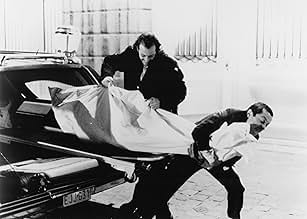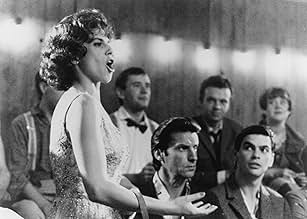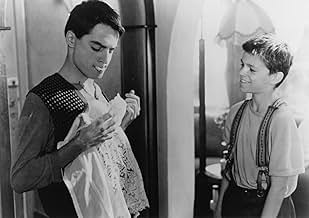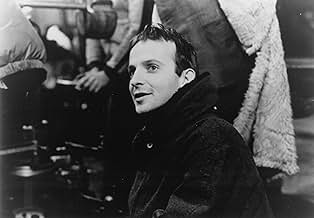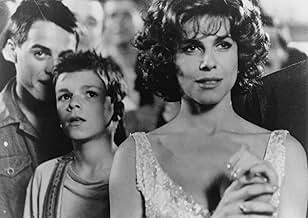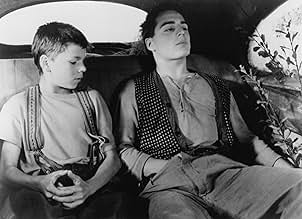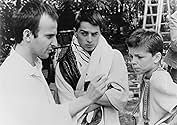Crazy Love
- 1987
- 1h 30min
CALIFICACIÓN DE IMDb
6.7/10
1.5 k
TU CALIFICACIÓN
Agrega una trama en tu idiomaHarry Voss' life spans three pivotal days: his carefree youth, high school graduation, and lonely middle age, exploring life's fleeting moments and unfulfilled dreams.Harry Voss' life spans three pivotal days: his carefree youth, high school graduation, and lonely middle age, exploring life's fleeting moments and unfulfilled dreams.Harry Voss' life spans three pivotal days: his carefree youth, high school graduation, and lonely middle age, exploring life's fleeting moments and unfulfilled dreams.
- Dirección
- Guionistas
- Elenco
- Premios
- 7 premios ganados en total
Stanley Duchateau
- Théo
- (as Stan Duchateau)
- …
- Dirección
- Guionistas
- Todo el elenco y el equipo
- Producción, taquilla y más en IMDbPro
Opiniones destacadas
This movie shows the life of Harry Voss, from being a child with a romantic vision of the world to becoming a frustrated alcoholic. Only the third part is based on the short story "The copulating mermaid of Venice, California" by Charles Bukowski. But its development is so intense that it required two other chapters in order to make it even more meaningful. It mixes nice and entertaining images with black, depressing scenes and the end might not be everybody's taste. As one of the songs of the movie puts it, love hurts but it can also kill. Although the film can be funny at times it is mainly sad and it will not leave any spectator indifferent.
Rather effective three part tribute to Charles Bukowsi ( even if the first part is based on the semi autobiographical tale by his author of choice, Joe Fante). The middle section is more predictable than the others and all fairly shocking. The movie mixes music and tempos as well as mood to give just the right bitter sweet flavour with more than a hint of romanticism and drunkenness to give this the authentic air. The attempted initiation of the young boy, the acute acne humiliations and the necrophilia are all hard to take but the film is dressed well enough and a smile lingers despite it all. It also has to be said that the director has managed to convey a real sense of Bukowski's writings/life and that is no small feat in itself.
CRAZY LOVE (Love Is A Dog From Hell) is a romantically disquieting and dismaying film by Flemish director,Dominique Deruddere, and is loosely based on Charles Bukowski's short story, "The Copulating Mermaid From Venice, California". Bukowski is often referred to as, "The Poet Laueate of Skid Row", and all of his work embraces the darker aspects of reality, and this film is certainly no exception. CRAZY LOVE is divided into three parts, and examines the life of the deeply flawed and conflicted individual, Harry Voss. In the first section, we witness Harry at the age of twelve as he begins to intuit the romantic possibilities of Love, and is introduced to the sordid mechanics of sex. And, in the second section, he is a senior in high school who tries to establish some kind of a romantic relationship with the opposite sex while dealing with a disfiguring case of acne. And, in the final section, Harry directly confronts the most perfect manifestation of his sexual and romantic desires. The film is a minor classic of Flemish cinema, and the Netlix disc contains an excellent Bonus Selection which offers an insightful conversation with the director, a short feature on the making of the film, and a brief description of the history of Belgium film-making. CRAZY LOVE is certainly not for everyone, but Bukowski has said that this film comes the closest to capturing the essence of his work.
I can assure you that Mondo Macabro is truly the wild side of cinema. The flicks these guys dish out are of all levels of genre's. Drama, horror, exploitation, euro, thriller, cult, etc.. Nice tot see someone hand out films that are of quality from all walks of life. Crazy love is all about the other walks of life.
O.K., I can understand growing up in a town way out in Belgium somewhere in 55, attending local cinema and becoming enthralled amongst the gleaming screen of persuasion. I'm talking on a male perspective, sorry ladies. You come running home with the thoughts of kissing, petting and other boner reacting thoughts. You hang out with a next door pal which is a little older and tosses you into the whole scheme of things, of supposed love making. You both fail miserably but on you must go. That I can understand. What I can't understand is how someone could freely talk masturbation when you where such a pre teen, then have your buddy whip it out and throw one back in front of you? I don't think so. The director had that happen, and it was his brother. So maybe it could happen but look where he is from. Well, On to 1962, a few years older and a complexion only a mother could love. You feel really bad, you understand what he going through and he still can't land that lady he most certainly loves.
On to the 70's and by now, you would think he would at least have found Mrs. right? Wrong, still no luck and no a drunken loser. He hooks back up with old time budd and for old times sake. Lets steal a corpse and see what he does. You have to see what true love would do to you.
I thoroughly enjoyed the film, other then the jerk of class I was drenched in emotion. Kind of like an after school special if you will. The director talks a little about the flick and his reasoning. Sure, he knows what he's talking about but when he fessed up to the brother showing brother, or brother watching brother part of his life. I sort of turned the rest off and couldn't get that vision out of my head. A disturbing touch to an already disturbing story. An off the beaten path for this label to come out with but cult is cult and the wild side of cinema needs a home somewhere.
O.K., I can understand growing up in a town way out in Belgium somewhere in 55, attending local cinema and becoming enthralled amongst the gleaming screen of persuasion. I'm talking on a male perspective, sorry ladies. You come running home with the thoughts of kissing, petting and other boner reacting thoughts. You hang out with a next door pal which is a little older and tosses you into the whole scheme of things, of supposed love making. You both fail miserably but on you must go. That I can understand. What I can't understand is how someone could freely talk masturbation when you where such a pre teen, then have your buddy whip it out and throw one back in front of you? I don't think so. The director had that happen, and it was his brother. So maybe it could happen but look where he is from. Well, On to 1962, a few years older and a complexion only a mother could love. You feel really bad, you understand what he going through and he still can't land that lady he most certainly loves.
On to the 70's and by now, you would think he would at least have found Mrs. right? Wrong, still no luck and no a drunken loser. He hooks back up with old time budd and for old times sake. Lets steal a corpse and see what he does. You have to see what true love would do to you.
I thoroughly enjoyed the film, other then the jerk of class I was drenched in emotion. Kind of like an after school special if you will. The director talks a little about the flick and his reasoning. Sure, he knows what he's talking about but when he fessed up to the brother showing brother, or brother watching brother part of his life. I sort of turned the rest off and couldn't get that vision out of my head. A disturbing touch to an already disturbing story. An off the beaten path for this label to come out with but cult is cult and the wild side of cinema needs a home somewhere.
Crazy Love (1987), directed by Belgian filmmaker Dominique Deruddere, holds a unique place in cinematic history as the first Flemish-Belgian film to hit theaters in North America. Adapted from Charles Bukowski's controversial short story "The Copulating Mermaid of Venice, California," the film sparked significant debate, particularly in the United States, due to its provocative subject matter.
In the 80s, Madonna, Sean Penn, and Francis Ford Coppola, all close to Bukowski at the time, championed the film's release, but ultimately it failed to achieve the expected box office success.
However, the film's exceptional cinematography and the actors' remarkable performances have solidified its position among the best and most epic Bukowski adaptations. When Netflix introduced the film to a wider audience in early 2020, the world had changed, and the film finally attained its well-deserved cult status.
The film's visual style, crafted by cinematographer Willy Stassen, is a gritty and unflinching portrayal of the underbelly of Belgian society, mirroring the raw and often disturbing nature of Bukowski's writing. The performances, particularly Josse De Pauw's portrayal of Harry Voss across three different stages of his life, are nuanced and captivating, capturing the essence of Bukowski's anti-hero.
While the film may have been ahead of its time in 1987, its themes of love, obsession, and self-destruction remain as relevant as ever. The film's unflinching honesty and dark humor resonate with audiences who appreciate Bukowski's unique brand of storytelling.
"Crazy Love" is a testament to the enduring power of Bukowski's work and the ability of cinema to transcend cultural boundaries and provoke thought. It is a film that deserves to be discovered and rediscovered by new generations of viewers.
In the 80s, Madonna, Sean Penn, and Francis Ford Coppola, all close to Bukowski at the time, championed the film's release, but ultimately it failed to achieve the expected box office success.
However, the film's exceptional cinematography and the actors' remarkable performances have solidified its position among the best and most epic Bukowski adaptations. When Netflix introduced the film to a wider audience in early 2020, the world had changed, and the film finally attained its well-deserved cult status.
The film's visual style, crafted by cinematographer Willy Stassen, is a gritty and unflinching portrayal of the underbelly of Belgian society, mirroring the raw and often disturbing nature of Bukowski's writing. The performances, particularly Josse De Pauw's portrayal of Harry Voss across three different stages of his life, are nuanced and captivating, capturing the essence of Bukowski's anti-hero.
While the film may have been ahead of its time in 1987, its themes of love, obsession, and self-destruction remain as relevant as ever. The film's unflinching honesty and dark humor resonate with audiences who appreciate Bukowski's unique brand of storytelling.
"Crazy Love" is a testament to the enduring power of Bukowski's work and the ability of cinema to transcend cultural boundaries and provoke thought. It is a film that deserves to be discovered and rediscovered by new generations of viewers.
¿Sabías que…?
- TriviaRegarded by Charles Bukowski as the most successful effort to bring his work to the screen.
- ConexionesReferenced in Film Junk Podcast: Episode 548: Making a Murderer (2016)
Selecciones populares
Inicia sesión para calificar y agrega a la lista de videos para obtener recomendaciones personalizadas
- How long is Crazy Love?Con tecnología de Alexa
Detalles
Taquilla
- Total en EE. UU. y Canadá
- USD 119,919
- Tiempo de ejecución1 hora 30 minutos
- Mezcla de sonido
- Relación de aspecto
- 1.66 : 1
Contribuir a esta página
Sugiere una edición o agrega el contenido que falta

Principales brechas de datos
What is the Spanish language plot outline for Crazy Love (1987)?
Responda

